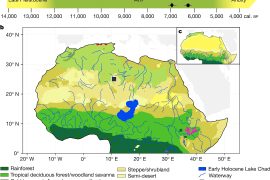
Vision loss in childhood also affects hearing
Ever wondered how one sense can influence the other? Researchers from Anglia Ruskin University (ARU) and University of East Anglia (UEA) have discovered something, quite mystifying. People who suffer vision loss in childhood struggle more than those who experience it later in life when it comes to accurately judging the location of a sound.
Led by Professor Shahina Pardhan, director of the Vision and Eye Research Institute at ARU, this pioneering study highlights how the two senses – sight and hearing – are interconnected in ways we never realized before.
Dr. Pardhan and her team’s findings help us delve into the world of people with vision loss, shedding light on the challenges they face in their day-to-day lives.
Vision loss and sound location
It appears that growing up with blurry sights or plunging into darkness at a tender age has its unique impact. The findings reveal that individuals who lose their vision before the age of 10 find it harder to judge the location of sounds.
Imagine being asked to guess the source of a sound. Now think about those who have had partial vision loss during their childhood, for whom this is a part of their daily routine. Our study participants, 52 individuals all under the age of 33, were put to the test – and the results were intriguing.
Sound and vision of distance
The experiment involved 480 trials, spanning an hour and forty minutes, during which participants estimated the distance of each sound. The sounds, which varied among speech, music, and noise, were emitted from distances ranging from 1.2m to 13.8m away.
The results were revealing. Individuals with early-onset vision loss were more likely to overestimate the distance of sounds up to five meters away.
They perceived the sounds to be coming from farther away than they actually were. These findings reveal a complex relationship between vision loss and our perception of sound.
Vision of sound: A nuanced perspective
On the other hand, later-onset vision loss did not significantly alter distance judgments when compared to the fully-sighted control group.
This points towards how our sensory perception develops and adapts over time. The time frame of vision loss plays a distinct role in how we perceive our environment through our other senses.
According to Dr. Andrew Kolarik, co-author of the study from UEA’s School of Psychology and ARU’s Vision and Eye Research Institute, the research shows that even partial vision loss can lead to changes in hearing abilities, especially if vision is lost early on in life.
What does this mean?
How does this impact the everyday lives of individuals with early vision loss? Here’s a simple example. Imagine trying to cross a road and being unable to accurately judge the distance of the sound of an approaching vehicle.
Professor Pardhan emphasized the importance of this study for the healthcare needs of people who suffered partial vision loss early in life, such as at birth or in childhood, who tend to be reliant on their other sensory abilities.
Implications for support and rehabilitation
Understanding the intricate relationship between vision loss and sound perception is crucial for developing support strategies.
Future studies could explore additional sensory adaptations in individuals with various types of vision loss, offering deeper insights into their unique experiences and challenges.
Professionals in rehabilitation can tailor their approaches to address the specific challenges faced by individuals with early-onset vision loss.
Encouraging engagement in exercises that enhance sound localization skills may enable these individuals to navigate their environments more safely and confidently, ultimately improving their quality of life.
Significance of the study
“These results suggest that people who suffer vision loss at birth or in early childhood are more likely to struggle to accurately judge the distance of close-range sounds,” explained Professor Pardhan.
“This is the first study of its kind and is important when assessing the healthcare needs of people who suffered partial vision loss early in life, such as at birth or in childhood, who tend to be reliant on their other sensory abilities.”
Professor Pardhan hopes the research will ultimately contribute to solutions to improve the lives of people with vision loss across the world.
That’s just the tip of the iceberg. We are only just peeling the layers off this fascinating relationship between our senses. And while there is much more to uncover, one thing is certain – our senses are more interconnected than we ever thought possible.
Isn’t it fascinating how the absence of one sense can influence our perception through the others?
The study is published in the journal Optometry and Vision Science.
—–
Like what you read? Subscribe to our newsletter for engaging articles, exclusive content, and the latest updates.
Check us out on EarthSnap, a free app brought to you by Eric Ralls and Earth.com.
—–













